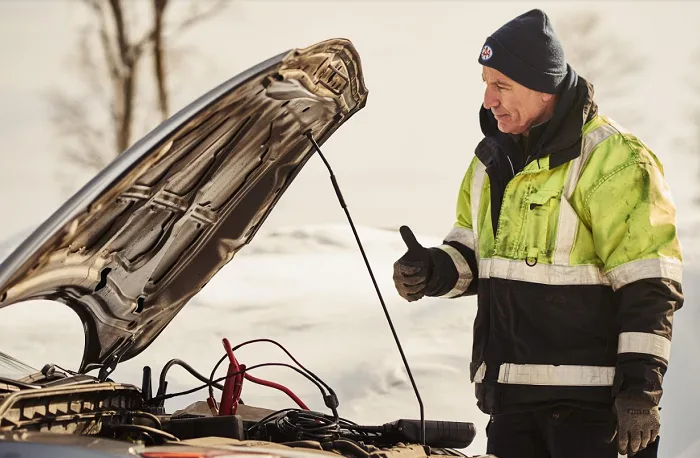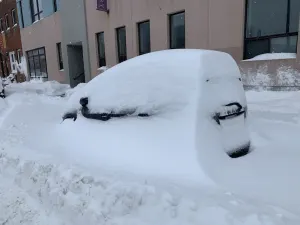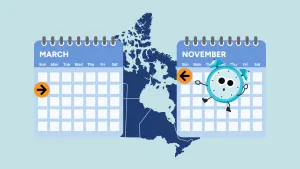
Ensure you and your vehicle are up to speed this winter
The dangers of winter driving and how to protect yourself
Although snowy scenes may look serene, roads can be treacherous.
“Weather plays a huge factor [in accidents], but it’s not an excuse,” says Sgt. Brett Moore of the Toronto Police Service.
On a wintry day, numerous crashes happen, varying in severity. However, not everyone is aware of what to do if they're involved in an accident.
Officers say the first step should be a given: to abide by the provincial slogan “Steer it to Clear it.”
“Especially if you’re on a highway,” adds Sgt. Moore. “If you’re on the Gardiner or the Don Valley Parkway, get it off the road.”
If the accident is serious, emergency personnel will be deployed and officers will attend the scene, but the majority of the time accidents should be reported at a collision reporting centre.
On average, there are about 80,000 crashes in Toronto annually. Around 85 per cent of them are referred to reporting centres, leaving about 15 per cent to be investigated by officers at the roadside.
After a collision, and after you've found a safe spot on the shoulder of the road, Sgt. Moore suggests snapping photos of the license plates of the cars involved, of the other driver(s), damages to the cars involved, and writing down the license and ownership insurance information from the parties involved.
In Ontario, you must report a collision if the combined damage to all vehicles is more than $2,000.
“That’s the thing. It’s not just ‘oh my car is ok, right? I just got a little scratch on it, I don’t need to make a report.’ Wrong. It’s the combined damage of both vehicles or if there’s more than two, altogether, that triggers that sort of mandatory collision report to the Ministry of Transportation,” Sgt. Moore explains.
“Don’t freak out. It’s a bad day. We know it’s already happened. Make the report. Get the information from everybody that’s involved. Safely make your way down to the collision reporting centre.”
PREPARING YOUR CAR FOR WINTER WEATHER DRIVING
There are a few things that you as the driver can do to prepare for a winter behind the wheel and it starts with changing your tires.
“Winter tires have a compound in them called silica and what that does is it allows the tire to grip the ground more easily,” says Kaitlynn Furse from CAA South Central Ontario. “So people think of winter tires when it’s snowing but it is really important actually for temperature as well.”
When in the shop doing the tire swap, a quick battery check is also recommended.
“Many people may not realize but about 98 per cent of the calls that we get at CAA are for things like breakdowns or battery failures,” Furse says.
She said nowadays, batteries last three to five years.
“That's because we’re using a lot more technology and entertainment in our vehicles and they're getting drained ... it also has to do with extreme weather conditions ... so really, really hot summer days [and] really, really cold winter days,” Furse adds.
She says when the temperature drops, fluids thicken, like windshield wiper fluid and oil. This means they don’t function as well as they should.
Making sure your vehicle is in check is important, but it’s also important to keep an emergency kit on board.
Furse recommends stocking your car with blankets, mittens, hats, a flashlight, candles, and flares.
She suggests people keep non-perishable food items and water in the car as well, in case you may be waiting for assistance a bit longer than expected.
WINTER DRIVING TIPS
KNOW YOUR RIGHTS
If you end up on the side of the road in Ontario, here's what you should know.
CAA created the Towing Bill of Rights in 2018, a set of simple points that motorists can follow based on Ontario’s Consumer Protection Act.
Here are CAA’s eight simple points:
You have the right to decide who can tow your vehicle and to what location unless otherwise directed by police.
A permission to tow form must be signed before towing starts unless you have an auto club membership.
The towing company must provide you with an itemized invoice, before receiving payment.
The final bill cannot be more than 10 per cent above the quoted price.
If you choose, you can pay by credit card.
During business hours, you can access your vehicle to get your personal items, while it's stored at a towing facility.
A tow operator must notify you where your vehicle will be towed.
Tow operators must disclose if they are receiving a financial incentive for towing your vehicle to a particular vehicle storage facility or repair shop.
“Make sure that you’re in a safe place and if you’re not, try and get as close to the shoulder or off the road as possible,” says Raymond Chan from CAA South Central Ontario.
“If you’re in an emergency situation make sure you contact emergency services, police fire, and ambulance for assistance.”
DRIVING ACCORDING TO THE CONDITIONS
Sgt. Moore says being mentally prepared for the conditions is as important as making sure your vehicle is ready.
“Do you have your head in the game? Wake up in the morning, have you left a little extra time in the morning so you’re not flying down the roads, saying ‘oh, I’m going to be late’.”
For winter driving best practices, see our expert tips and recommendations, here.
--
Editor's Note: This article was originally published in December 2019.










